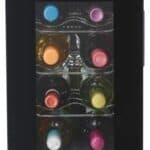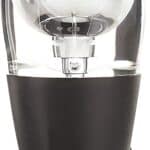When it comes to alcoholic drinks, everyone is familiar with how beverages like beers are carbonated – but there’s a lot of questions still hanging over wine. Is there such a thing as carbonated wine?

Here we are going to be talking about wine and if there is such a thing as carbonated wine.
This way, you can learn more about how wine is made and all the different possibilities there are when it comes to taste and flavor.
So, if you want to find out if carbonated wine exists, just read the information below!
What Is A Carbonated Drink?
First, let’s talk about carbonation. What does it even mean if a drink is carbonated?
Carbonated means that a drink contains carbon dioxide which has been dissolved into the water. This presence of carbon dioxide will appear in the form of bubbles as there is a gas trapped in the liquid, and this will cause the liquid to be fizzy.
Examples of some popular carbonated drinks include soda, spring water, and beer.
Carbonation is usually seen as an artificial process but actually, carbonated drinks can naturally occur, such as spring water.
This is because carbonation can naturally occur due to pressurizing – but despite this fact, carbonation is still traditionally seen as an artificial process manufacturers do to their products.
So, basically, a carbonated drink is a drink that is really fizzy and bubbly due to the presence of carbon dioxide. But why? What’s the point in carbonating drinks?
Well, the fizzy sensation that comes with a carbonated beverage is viewed as pleasant to a lot of people and some people like the carbonated taste that comes with carbonated drinks.
Some even view carbonated drinks as healthy tonics that can help with upset stomachs and indigestion.
So there are plenty of reasons why someone would want to drink a carbonated drink – but what about alcoholic drinks? Can they be carbonated?
Carbonated Alcoholic Drinks – Do They Exist?
The most popular carbonated alcoholic drink has to be beer. However, it’s not actually artificially carbonated by its producers – beer is naturally carbonated during the brewery process.
This is due to another process which happens during the brewery of beer – fermentation.
Fermentation is a process which occurs in all products of alcohol as it involves converting the residual sugars and glucose in drinks into alcohol.
Without this process, drinks like beer will not be alcoholic so it is a vital part of the brewery process.
However, during the fermentation process, there is another by-product which is produced alongside the alcohol – carbon dioxide.
So, all beers are brewed and carbonated during their creation due to the fact that carbon dioxide is produced during the fermentation process. This means that carbonated alcoholic beverages definitely do exist.
So, what about wine? Is wine carbonated or not?
Is Wine Carbonated? The Truth!
Your initial thought first may be that wine is not carbonated because it’s not fizzy like soda or beer. The lack of bubbles and fizz must mean that wine is not a carbonated beverage, right?
Well, wine does go through the same fermentation process as beer in order to turn what is essentially grape juice into an alcoholic beverage known as wine.
This means that the yeast in wine turns the glucose and sugars present into alcohol – and this process still produces carbon dioxide as a by-product.
This means that, in a way, all wine is carbonated because it goes through the natural fermentation process which naturally produces carbon dioxide.
But, by the time the wine is bottled and at home in our kitchens, most wines are no longer fizzy – why is that?
It’s because the carbon dioxide produced during the fermentation process is purposefully allowed to ‘escape’ from the wine.
When wine is in its fermentation process, its key is built with a valve which allows carbon dioxide to escape the keg. However, oxygen or other gasses cannot enter the keg – only gasses can escape the keg.
This means that fermented wine does not experience the same pressure as other fermented drinks like beer, so the carbon dioxide can escape the wine and it will not taste fizzy or bubbly.
With other fermented alcoholic drinks like beer, the keys are purposefully put under-pressure and there is no escape valve present for the carbon dioxide. This forces the gas to be trapped inside the liquid and carbonate it.
Wine does not do this as the carbon dioxide escapes through the valve.
So, wine is carbonated during the fermentation process but the carbon dioxide is allowed to escape. The end result is a smooth, non-carbonated drink that is not fizzy or bubbly due to the lack of carbon dioxide.
However, there is one exception to the rule – sparkling wine.
Is Sparkling Wine Carbonated?
Sparkling wine is wine that has been fermented under pressure, just like with beer. This means that the wine keg did not have a valve to allow the carbon dioxide to escape so the gasses were trapped inside the liquid.
The end result here is a fizzy, bubbly wine that is definitely carbonated – sparkling wine.
Sparkling wine is a lot more common than you would think. Popular types of sparkling wine include Prosecco, Cava, and Champagne.
All of these beverages are a type of carbonated wine beloved for its fizzy and bubbly taste.
In fact, champagne is so well-known that some people even mistake it for its own type of alcohol separate from wine when in fact, it is just the original type of sparkling wine.
Final Thoughts
So, wine can indeed be carbonated.
Well known types of carbonated wine include Champagne and Prosecco, but not all wines are carbonated. Most wines are fermented with an escape valve built into its keg, allowing any carbon dioxide created during the fermentation process to escape.
This means that the gasses are not trapped inside the liquid, thus making it smooth and not fizzy at all.
We hope this has helped you understand the fermentation process and why wine is not traditionally fizzy unlike other alcoholic drinks like beer or Champagne!
- How to Learn Wine Tasting: Essentials for Beginners - March 10, 2024
- How to Learn to Like Wine: Cultivating an Appreciation for the Vintner’s Art - March 10, 2024
- Thanksgiving Sangria: A Flavorful Twist to Your Holiday Table - August 27, 2023








